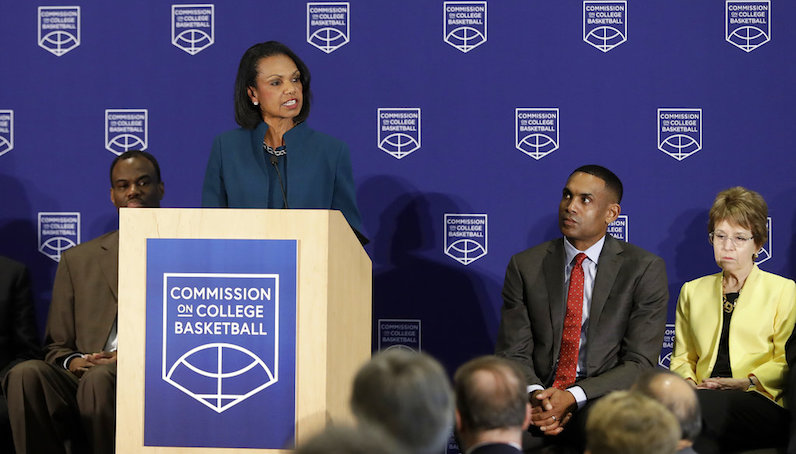On Wednesday morning, after months of meetings, the Commission on College Basketball released its proposals to help improve the state of major college basketball. The committee released a report, which can be found on its website. This was followed by a speech from the committee’s chair, Condoleeza Rice.
In her speech, Rice briefly outlined the committee’s multi-pronged approach to rid the amateur sport of corruption; this, of course, was brought on due to the federal investigation into college basketball. Rice, who has previously worked with the NCAA, called upon these reforms.
NBA and the Draft
Rice would like to see the NBA remove it’s “one-and-done” rule, which requires players to be a year removed from high school to be draft eligible. The NBA’s league office can’t wave a wand and do this, though; it requires partnership with the players association — the NBPA.
For whatever it’s worth, the NBA wants to correct this rule, too. And luckily for the NCAA, the NBA and NBPA have labor peace — a striking contrast to what you see with the NFL and its players association.
According to ESPN’s Adrian Wojnarowski, the 2020 Draft is targeted as the earliest possible date for change. Rice and the commission appear to be leaning heavily on help from the NBA.
The NBA and NBPA conversations on eliminating the one-and-done draft rule — which would allow high school seniors to enter the NBA — are centered on the 2020 Draft as the earliest possible date for change, league sources tell ESPN.
— Adrian Wojnarowski (@wojespn) April 25, 2018
The Commission on College Basketball would like for players to be able to enter the draft after high school — or any year of college. If the player goes undrafted, he would be allowed to return to school. The key detail here, though: this would be contingent on the player not hiring an agent. If a player received representation, it would, in the eyes of this committee, void his amateur status.
Rice: "We need to put the college back in college basketball.” Her commission is calling on the NBA to end the one-and-done rule. If it doesn't, commission will reconvene and consider other measures, including freshman ineligibility.
— Andrew Carter (@_andrewcarter) April 25, 2018
According to Rice, the committee is not in favor of the college baseball model.
Agents and Marketing
As the Associated Press reports, the commission would like to allow for some change here. The new proposal would allow certified agents to meet/work with high school and college players, and their families, to help make informed choices about professional opportunities.
In her comments, Rice didn’t state specifically how this process would work, but mentioned that the NCAA would have a seat at the proverbial table, too.
Rice stated that the commission thought “long and hard” on compensation for athletes in the form of marketing dollars. However, the group didn’t want to recommend legislation without knowing the proper legal parameters, per Rice. It appears as though this group would like to stick with the current paradigm — not some of the more progressive models that have also been proposed.
The Commission on College Basketball's recommendations are a predictable double-down on the NCAA's economic control of athletes and their families.
— Patrick Hruby (@patrick_hruby) April 25, 2018
Tougher Penalties
The Commission on College Basketball would like to see an independent investigative and adjudicative body created to resolve complex and serious cases that involve NCAA violations.
According to the AP, the commission proposes enforcing more stringent punishments — in hopes of deterring future rules violations:
- Increased competition penalties for Level I violations to allow a five-year post-season ban
- Increased financial penalties for Level I violations to allow loss of all revenue sharing in postseason play for the entire period of the ban
- Increased penalties for a show-cause order to allow lifetime bans
- Increased penalties for head coach restrictions to allow bans of more than one season; increased penalties for recruiting visit violations to allow full-year visit bans.
Additionally: in an effort to cut down on frequent offenders int he coaching profession, universities that that employ a coach under a show-cause order from a previous institution would be at risk to receive the harshest penalties; that’s if NCAA violations occur under that coach.
Changes to the Board of Governors
The panel also proposed adding five independent members with full voting privileges to the NCAA Board of Governors — a group currently comprised of 16 university presidents or athletic directors. (The ACC has two members on this board: Miami’s Blake James and Bud Peterson of Georgia Tech.)
The Future of AAU Basketball
This is clearly another area of focus for the commission — what Rice referred to as “non-scholastic basketball.” The commission would like to enforce a new standard for AAU basketball and summer recruiting events (like the Nike EYBL, I’d imagine).
Again, the move here is for everything to be out on the table; those running the event, its sponsors and coaches must work together for increased financial transparency.
In addition, events that don’t meet the criteria, and aren’t certified, should not be attended by coaches. They would be banned for attending said events.
The panel would like to see new youth basketball programs created in partnership with the NCAA, NBA and USA Basketball. This would include NCAA-run recruiting events in the summertime, and increased time for the NBA USA Basketball to evaluate players before they enter college.
Increased Transparency — On Multiple Levels
Led by Rice, the Commission on College Basketball would also like to see that coaches, athletic directors and university presidents certify annually, and also comply with NCAA investigations, if need be. All of this would be done in an effort to ensure that athletic programs follow NCAA rules.
Read More
David Glenn on potential outcomes for NC State and the FBI’s investigation into college basketball

















